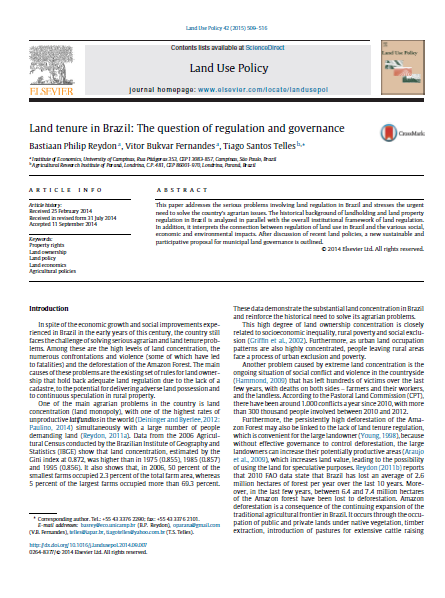Elsevier is a world-leading provider of information solutions that enhance the performance of science, health, and technology professionals.
All knowledge begins as uncommon—unrecognized, undervalued, and sometimes unaccepted. But with the right perspective, the uncommon can become the exceptional.
That’s why Elsevier is dedicated to making uncommon knowledge, common—through validation, integration, and connection. Between our carefully-curated information databases, smart social networks, intelligent search tools, and thousands of scholarly books and journals, we have a great responsibility and relentless passion for making information actionable.
Members:
Resources
Displaying 61 - 65 of 1605Earthworm communities in arable fields and restored field margins, as related to management practices and surrounding landscape diversity
Earthworm communities in arable fields and restored field margins, as related to management practices and surrounding landscape diversity
Land tenure in Brazil: The question of regulation and governance
This paper addresses the serious problems involving land regulation in Brazil and stresses the urgentneed to solve the country's agrarian issues. The historical background of landholding and land propertyregulation in Brazil is analyzed in parallel with the overall institutional framework of land regulation. In addition, it interprets the connection between regulation of land use in Brazil and the various social,economic and environmental impacts. After discussion of recent land policies, a new sustainable andparticipative proposal for municipal land governance is outlined.
Sustainable recommendation domains for scaling agricultural technologies in Tanzania
Low adoption of sustainable intensification technologies hinders achievement of their potential impacts on increasing agricultural productivity. Proper targeting of locations to scale-out particular technologies is a key determinant of the rate of adoption. Targeting locations with similar biophysical and socio-economic characteristics significantly increases the probability of adoption. Areas with similar biophysical and socio-economic characteristics are referred to as recommendation domains (RDs).
Sustainable recommendation domains for scaling agricultural technologies in Tanzania
Low adoption of sustainable intensification technologies hinders achievement of their potential impacts on increasing agricultural productivity. Proper targeting of locations to scale-out particular technologies is a key determinant of the rate of adoption. Targeting locations with similar biophysical and socio-economic characteristics significantly increases the probability of adoption. Areas with similar biophysical and socio-economic characteristics are referred to as recommendation domains (RDs).



